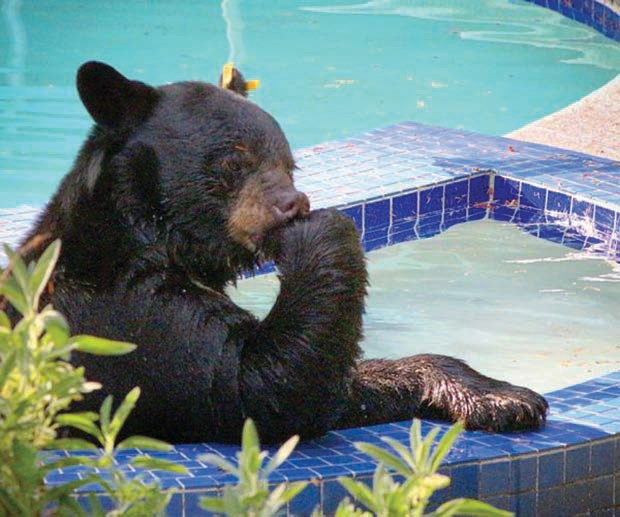Conservation officers on the North Shore say they’ll be blitzing residential neighbourhoods with warnings to keep the garbage and bird feeders locked up after a record number of calls about bears were received recently.
In the first few weeks of September, conservation officers received almost 250 calls about problem bears in North Vancouver and West Vancouver, said Sgt. Simon Gravel of the B.C. conservation office.
“That’s a lot of calls,” said Gravel. And those calls haven’t let up yet.
This year, the situation was made worse by the summer drought, which meant an early and lacklustre berry crop in the alpine. “If there’s no natural food they’ll look for non-natural food,” said Gravel.
Too often, bears are finding that, he said – in the form of garbage left out overnight, trees with ripe fruit that hasn’t been picked and birdfeeders brimming with seeds.
That’s a recipe for bears to become habituated to human food sources, he said – a situation that rarely ends well for the bear.
Once a pattern becomes established, it’s hard to break, said Gravel, and relocating the bear is often only a short-term solution.
Once a bear has decided he’s found a good food source, “sometimes it takes a day, sometimes it takes five days, he’ll come back.”
The key is for residents to get rid of possible food sources that could attract bears. Many new residents in West Vancouver may not even be aware that there’s a bear problem, said Gravel. “We have to keep hammering that message.”
Gravel said there’s a bear family of a sow and two cubs that have been very active in the British Properties this fall. Other areas where bears have been active include Keith Road and drainages leading into Lighthouse Park. “It’s a natural corridor for wildlife,” he said.
Off-leash dogs can also present problems for bears at this time of year, said Gravel. One off-leash dog recently chased a bear in the British Properties. When the owner got involved, he was scratched by the bear, which was reacting defensively, said Gravel.
In North Vancouver, conservation officers recently set a trap for a bear caught on camera taking a dip in a swimming pool. That bear had been previously trapped and relocated and had been getting into fruit trees and garbage. Most recently, the bear took up residence under a house, said conservation officer Todd Hunter. The bear ran away before conservation officers managed to tranquilize it.
Turns out, a bear deciding to take a dip in a pool isn’t that unusual.
Bears have also been known to like hot tubs – primarily because of the Styrofoam hot-tub cover, which has a scent that mimics that of an ants’ nest. “I’ve seen many bears destroying them,” said Gravel.
Managing potential bear attractants is a perennial issue at this time of year.
Sometimes people will store their garbage in their garage before pickup day – but leave the garage door open. Once they smell food, “It’s very easy for a bear to climb a six-foot fence or even a 10-foot fence,” said Gravel. Residents who persist in not getting the message about managing bear attractants can be hit with a $230 fine.



